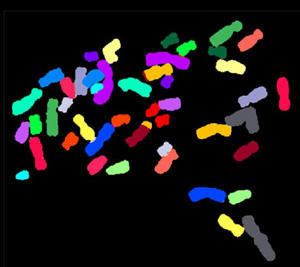
染色体(彩色部分)
北卡罗来纳大学的生物学家等组成了一个国际研究小组,他们首次确定了导致多倍体细胞的机制,细胞在该机制影响下会包含2套以上的染色体。
在染色体和携带基因方面,人类组织细胞呈现出配对的特点。46条染色体集群在细胞核内,其中一套23条染色体来源于父亲或母亲。因此,从细胞的角度说,人类是二倍体生物。
但是,在植物和昆虫中,细胞染色体以多倍体存在的现象很普遍,多倍体是指染色体不止2套。细胞生长借助其体积增长而不是有丝分裂过程中细胞数量的扩增,这会让更多的DNA挤压在同一个细胞核中。
多倍体也会出现在二倍体动物(包括人类)的一些组织中,例如肌肉、胎盘和肝脏等特化的组织器官,它们表现出非常活跃的生物学特性,能够产生体积大的多倍体细胞。
德国海德堡大学的遗传学家布鲁斯. 埃德加 (Bruce Edgar)博士领导了该研究的一部分,并将结论发表在10月30日的在线版《Nature》期刊上。研究小组首次确定了细胞多倍化的调控机制。
研究的共同作者Robert J. Duronio博士是北卡罗来纳大学的生物学和遗传学教授,他说:“许多生物体实现生长的方式是细胞体积的增大而不是细胞数量的增加。果蝇的一些细胞经过特殊的细胞周期—核内分裂而引起多倍化,在这一过程中,细胞进行DNA复制,但避开了有丝分裂。”
果蝇细胞中已知分子能调控特定类型的细胞周期,引起细胞的多倍化。数据化模拟这些分子活动后,我们预测它们在核内分裂过程中是如何被调控的。
Duronio博士说:“研究表明,基因的开启和关闭对细胞核内分裂和多倍化具有重要作用。我们发现,该机制中一次特定干扰或突变能阻断细胞进行胞内分裂。”
北卡罗来纳大学的研究人员说:“下一步研究的目标是能够调控细胞的多倍化,这对于肝脏再生或肝脏疾病来说很重要,因为多倍体肝细胞在肝功能执行过程中担当重要角色:解毒或其它生物学功能。”(生物探索译)
相关英文论文摘要:
Control of Drosophila endocycles by E2F and CRL4CDT2
Endocycles are variant cell cycles comprised of DNA synthesis (S)- and gap (G)-phases but lacking mitosis. Such cycles facilitate post-mitotic growth in many invertebrate and plant cells, and are so ubiquitous that they may account for up to half the world’s biomass. DNA replication in endocycling Drosophila cells is triggered by cyclin E/cyclin dependent kinase 2 (CYCE/CDK2), but this kinase must be inactivated during each G-phase to allow the assembly of pre-Replication Complexes (preRCs) for the next S-phase. How CYCE/CDK2 is periodically silenced to allow re-replication has not been established. Here, using genetic tests in parallel with computational modelling, we show that the endocycles of Drosophila are driven by a molecular oscillator in which the E2F1 transcription factor promotes CycE expression and S-phase initiation, S-phase then activates the CRL4CDT2 ubiquitin ligase, and this in turn mediates the destruction of E2F1. We propose that it is the transient loss of E2F1 during S phases that creates the window of low Cdk activity required for preRC formation. In support of this model overexpressed E2F1 accelerated endocycling, whereas a stabilized variant of E2F1 blocked endocycling by deregulating target genes, including CycE, as well as Cdk1 and mitotic cyclins. Moreover, we find that altering cell growth by changing nutrition or target of rapamycin (TOR) signalling impacts E2F1 translation, thereby making endocycle progression growth-dependent. Many of the regulatory interactions essential to this novel cell cycle oscillator are conserved in animals and plants, indicating that elements of this mechanism act in most growth-dependent cell cycles.
英文论文链接:https://www.nature.com/nature/journal/vaop/ncurrent/full/nature10579.html







